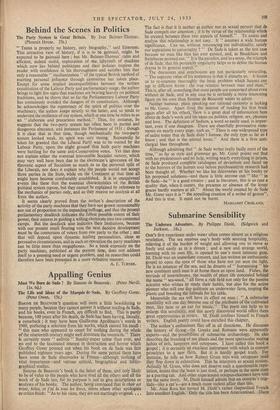Behind the Scenes in Politics
The Party System in Great Britain. By Ivor Bulmer-Thomas. (Phoenix House. 25s.) " THERE is properly no history, only biography," said Emerson. This attractive view of history, if it is to be gainsaid, might be expected to be gainsaid here ; but Mr. Bulmer-Thomas' calm and efficient, indeed stolid, exploration of the labyrinth of machine which now lies behind politicians and their policies inspires the reader with confidence in his thoroughness and satisfies him that only a reasonable " mechanization " of the typical British method of exerting personal influence through committee has taken place. Except for some implied incompatibilities between the written constitution of the Labour Party and parliamentary usage, the author brings to light few signs that machines are bearing heavily on political traditions, and he shows that so far the Parliamentary Labour Party has consciously avoided the dangers of its constitution. Although he acknowledges the supremacy of the spirit of politics over the machinery, the author keeps strictly to the latter, and so tends to underrate the resilience of our system, which at one time he refers to as an " elaborate and precarious method." Thus, for instance, he suggests that the two-party system has often been in partial and dangerous abeyance, and instances the Parliament of 1931 ; though it is clear that at that time, though mechanically the two-party system looked weak, its spirit was very strong. Repeatedly he takes for granted that the Liberal Party was to be ousted by the Labour Party, upon the slight ground that both party machines were battling for the same anti-Conservative votes. Yet that does not explain either the eventual irrevocable Socialist victory, which may very well have been due to the electorate's ignorance of the theoretic aspect of Socialism as much as to the personal split of the Liberals, nor does it explain why the people would not accept three parties in the State, while on the Continent at that time all might have become comfortably established. It is in unequivocal events like these that the essential characteristics of the British political system repose, but they cannot be explained by reference to the mechanics of parties only, and so they receive no analysis at all from the author.
It seems clearly proved from the author's description of the activity of the party machines that they have not grown unreasonably nor out of proportion to the expanding suffrage, and that the present parliamentary deadlock indicates the fullest possible extent of their power, their success in guiding a willing electorate into two contented camps. But the deadlock also indicates their limitations, because with our present small floating vote the next decisive development must be the conversion of voters from one party to the other ; and that will depend upon dynamic leading personalities, ideas or persuasive circumstances, and in such an operation the party machines can be little more than megaphones. So a book expressly on the party machines, published at the present time, does not addreis itself to a pressing need or urgent problem, and its researches could therefore have been presented in a more definitive manner.
A. E TURNER.


























 Previous page
Previous page